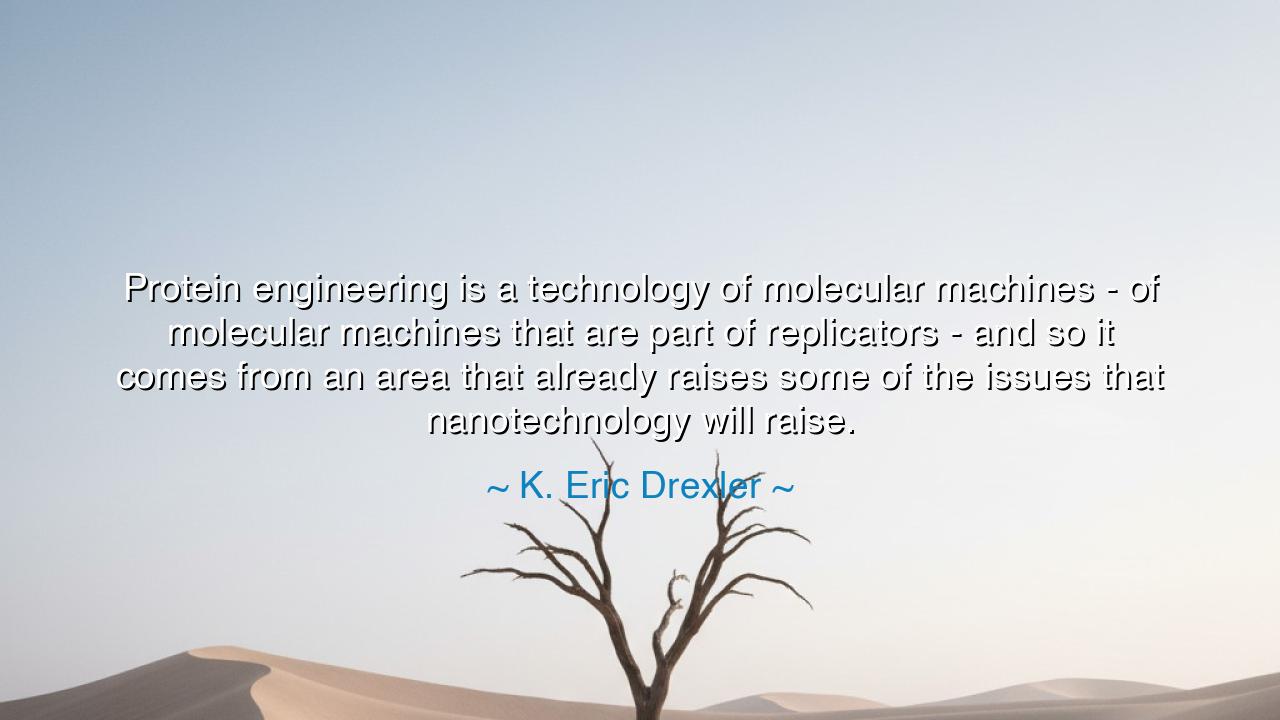
Protein engineering is a technology of molecular machines - of
Protein engineering is a technology of molecular machines - of molecular machines that are part of replicators - and so it comes from an area that already raises some of the issues that nanotechnology will raise.






K. Eric Drexler, often called the father of nanotechnology, spoke with the foresight of a prophet when he declared: “Protein engineering is a technology of molecular machines – of molecular machines that are part of replicators – and so it comes from an area that already raises some of the issues that nanotechnology will raise.” These words, though clothed in the language of science, carry the weight of destiny. For they reveal that the smallest structures in life—the proteins that weave the fabric of our bodies—are themselves machines, and by learning to shape them, mankind stands at the threshold of powers once thought divine.
To understand this saying, we must first behold what protein engineering means. Proteins are the tools of life, forged by nature through eons of evolution. They cut, they carry, they build, they break—each one a molecular machine working tirelessly in the unseen chambers of the cell. Drexler tells us that to engineer these is to step into the workshop of life itself, to take up the tools once held only by time and chance. In this act, humanity does not merely imitate nature; it begins to command it. And yet, as he warns, this is the very beginning of the questions that nanotechnology—the building of machines at the atomic scale—will thrust upon us.
History has shown that whenever mankind gains a new power, both wonder and danger arise. Consider the tale of Prometheus, who stole fire from the gods and gave it to men. With fire, civilization was born: warmth, cooking, forging. But with fire also came destruction, the burning of cities, the weapons of war. So too with protein engineering and nanotechnology: in them lies the promise of curing diseases, feeding the hungry, repairing the body at its deepest level. But also in them lies the peril of misuse—machines that could run amok, or weapons wrought not of steel, but of living molecules.
A nearer story speaks the same truth: the discovery of the atomic nucleus. At first, it was curiosity, the splitting of atoms to understand nature’s laws. Yet from this knowledge came both the light of nuclear energy and the shadow of the bomb that fell on Hiroshima. The lesson is eternal: when we master the hidden forces of creation, we must also master ourselves. Drexler’s words remind us that in shaping replicators—molecular systems that copy themselves—we approach a boundary where invention and life blur. It is a realm that demands not only brilliance, but wisdom.
Yet we must not shrink back in fear, for to do so would be to refuse the gifts of knowledge entrusted to us. The ancients gazed at the stars and wondered; we gaze into the cell and see a universe no less vast. If we dare with humility, nanotechnology may bring forth cures for suffering long thought incurable, materials stronger than steel yet lighter than air, and tools that restore the Earth itself. To deny this possibility is to chain ourselves to the present, rather than walk into the future.
But let us be vigilant. The lesson here is not to abandon protein engineering or nanotechnology, but to approach them with reverence. We must train not only our hands, but our hearts. We must ask not only, “What can we build?” but also, “Why shall we build it, and for whom?” Just as the farmer tends his field with care, knowing that neglect can turn abundance into famine, so must we tend these molecular fields with wisdom.
Therefore, O children of knowledge, take heed of Drexler’s words. See in them both a warning and a promise. Embrace the pursuit of discovery, but let your discoveries serve life, not diminish it. Study deeply, govern wisely, and act with compassion, for you stand at the frontier where man becomes a craftsman of life itself. Walk carefully, but do not turn back—for this path, if walked with wisdom, may lead us not to ruin, but to the flowering of a new age for mankind.






AAdministratorAdministrator
Welcome, honored guests. Please leave a comment, we will respond soon